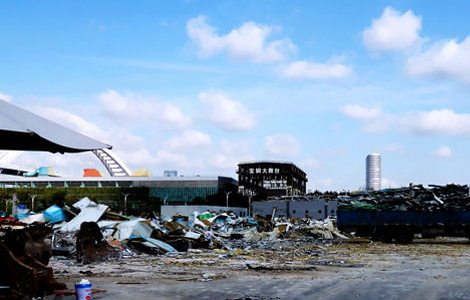Mexican president: US dumping criminals at border
Updated: 2011-10-21 08:49
(Agencies)
|
|||||||||||
MEXICO CITY — Mexican President Felipe Calderon accused the United States on Thursday of dumping criminals at the border because it is cheaper than prosecuting them, and said the practice has fueled violence in Mexico's border areas.
US officials earlier this week reported a record number of deportations in fiscal year 2011, and said the number of deportees with criminal convictions had nearly doubled since 2008.
"There are many factors in the violence that is being experienced in some Mexican border cities, but one of those is that the American authorities have gotten into the habit of simply deporting 60 (thousand) or 70,000 migrants per year to cities like Ciudad Juarez or Tijuana," Calderon told an immigration conference.
Among these deportees "there are many who really are criminals, who have committed some crime and it is simply cheaper to leave them on the Mexican side of the border than to prosecute them, as they should do, to see whether they are guilty or not," Calderon said. "And obviously, they quickly link up with criminal networks on the border."
On Tuesday, US Immigration and Customs Enforcement Director John Morton said his agency deported nearly 400,000 individuals during the fiscal year that ended in September, the largest number of removals in the agency's history.
Morton announced the 2011 numbers in Washington, saying about 55 percent of those deported had felony or misdemeanor convictions. Officials said the number of those convicted of crimes was up 89 percent from 2008. The vast majority of migrants, and deportees, are from Mexico.
When Mexicans without documents finish their prison terms in the United States, they're bused to the border and freed.
The United States and Mexico are experimenting with new methods of alerting Mexico about deportations, and US officials say they warn Mexico when former inmates are considered particularly dangerous.
Mexicans with criminal records in the US can't be detained in Mexico if they have not violated the law in their home country, and some Mexican border cities complain they don't have any easy way to run criminal background checks on deported inmates to see if they have pending charges.
One deported criminal, Martin Estrada Luna, is accused of becoming a leader of a cell of the Zetas drug cartel in the border state of Tamaulipas just 18 months after he was deported from the United States. Estrada, who had a long rap sheet of mostly theft and property crimes in Washington state, is now in custody in Mexico City, where he is accused for masterminding the killing of more than 250 people.
Calderon also lashed out at what he called "absurd" and "irrational" immigration laws in the United States.
"To the extent to which they continue to put absurd curbs on migration, to the degree to which they continue to persecute migrants in the United States in an irrational way that sometimes violates their human rights, in that measure American society will continue to lose competitiveness..." he said.
That was an apparent reference to tough immigration laws like the one implemented in Alabama in late September. While courts have blocked some provisions of the law, judges let stand provisions that allow police to check a person's immigration status during a traffic stop.
Under the measure, courts also can't enforce contracts involving illegal immigrants, such as leases, and it is a felony for an illegal immigrant to do business with the state for basic things like getting a driver's license.
Calderon said immigration shouldn't be seen as a threat or invasion; he noted that net migration of Mexicans to the United States is approaching zero, as fewer people leave and more come back.
Rafael Fernandez de Castro, head of the International Relations studies at the Monterrey Technological Institute, told the conference that about 200,000 Mexicans per year are returning to their country, and that Mexican schools are facing a new problem: tens of thousands of Mexican children are coming back each year with little or no Spanish.
"In the last couple of school years in Mexico, literally tens of thousands of children have turned up with last names like Sanchez, Fernandez, or Hinojosa and, it must be said, they don't speak Spanish, they speak English," Fernandez de Castro said. "We have to ask California and Texas how they managed to integrate these Mexican children who went to the United States and didn't speak English."
Hot Topics
Libya conflict, Gaddafi, Oil spill, Palace Museum scandal, Inflation, Japan's new PM, Trapped miners, Mooncake tax, Weekly photos, Hurricane Irene
Editor's Picks

|

|

|

|

|

|







